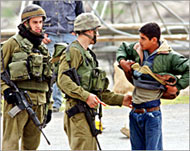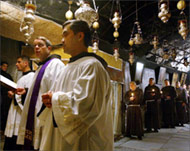Bethlehem gasps in an Israeli noose
When Israel “handed over” Bethlehem to the Palestinian Authority last summer, the town’s 140,000 strong inhabitants heaved a sigh of relief, thinking they were finally liberated from a brutal repression.

The Israeli army had wreaked havoc on the traditional birthplace of Jesus, culminating in the Spring of 2002 with a month-long siege of the Church of the Nativity inside which scores of Palestinian activists and several clergymen were holed up.
Other contiguous towns and refugee camps, such as Bait Jala, Bait Sahur, Duhaisha and Aida also had their share of pummelling, resulting in the death and maiming of scores of civilians and resistance activists and in widespread vandalism and destruction.
But hopes that the Israeli withdrawal from the Bethlehem district would give exhausted and tormented inhabitants respite, economic prosperity, or some semblance of freedom proved utterly illusive.
The “liberation of Bethlehem,” using PA official language, morphed into a suffocating, nightmarish blockade, crippling the area’s economy.
Harassment and humiliation
Today, Bethlehem is surrounded by checkpoints manned by obstructive soldiers, which Israel says are there to stop resistance fighters and bombers from moving easily – a tactic of dubious efficiency that effectively imprisons residents.
 |
|
Palestinian residents are stopped |
“As you see, we’re confined to a few square kilometres. We can’t leave our town freely, and when we venture to leave, we’re subjected to lots of harassment and humiliation,” said Victoria Bishara, a Bethlehem housewife.
“Honestly, I dread leaving my town because I’m worried about mistreatment by the Jews.”
Bishara sums up living conditions in Bethlehem since the Israeli “withdrawal” as a connected succession of woes.
“Closure breeds unemployment, unemployment breeds poverty and poverty causes depression. We’re not clinically depressed,” she says, raising her voice slightly, “but I assure you there’s not much joy in this city.”
“In any case, how can you feel good when you are surrounded by tanks, roadblocks and trigger-happy soldiers training their guns on you?”
Killing tourism
Hana Nasir is Bethlehem’s mayor who spends most of his time wondering how to keep his town’s vital services running. The task is never easy, he complains.
 |
|
Strained Christmas spirit at the |
“This sinister blockade has killed tourism to Bethlehem. In normal circumstances, we used to receive 120,000 tourists per month. Now we get less than 5000.
“And I’m afraid the apartheid wall will reduce this number to nil, so imagine what effect that will have on a town whose entire economy depends on tourism.”
The unprecedented siege on Bethlehem is not only preventing foreign tourists from getting into Bethlehem. It is also preventing the people of Bethlehem from travelling outside their town.
“Do you know that 70% of our Christian citizens have forgotten what the Church of the Sepulchre (in East Jerusalem) looks like and 70% of our Muslim citizens have forgotten what the al-Aqsa Mosque looks like.”
Devastated economy
While Nasir’s unscientific estimates may be an exaggeration, the devastating effects of the Israeli blockade on his city are clear.
Israel is destroying the Bethlehem district’s economy, causing unemployment to reach 60%, up from 10% in October 2000. Consequently, per capita income has plummeted from $2500 in 2000 to less than $400 now.
According to Nasir, as many as 500 Christian families from Bethlehem and surrounding areas have emigrated owing to economic hardships.
“There are limits to people’s forbearance. When people can no longer feed their kids and put food on the table, when their horizons are narrowed, they go elsewhere in search of work and a better life.”
Bad business
The number of tourists in Manger Square is viewed as a barometer of economic activity in Bethlehem. The square, overlooking the Church of the Nativity, used to bustle with tourists and pilgrims from all over the globe.
 |
|
A souvenir shopkeeper waits for |
Now, the spacious square is nearly empty, with more peddlers than tourists – a blow to tourism-dependant businesses such as souvenir shops and factories.
“I swear I haven’t seen a single tourist in a week,” says Yusuf Jacaman, owner of the Holy Land Souvenir Exhibit, 100 metres from the Church of the Nativity.
“Now, we don’t aspire to make profits, we only hope to feed our families and pay our rents and debts. Do you know, I haven’t paid my rent for the last three years?” complains Jacaman.
Asked how he and other souvenir shopkeepers were managing, Jacaman says simply, “We wait for better days.”
“We need several years of good business to be able to return to the pre-Intifada situation.”
Worst to come
Like most of the Christian and Muslim inhabitants of the area, the mayor worries that the worst is yet to come – because of Israel’s infamous separation wall.
 |
|
An empty Manager Square points |
The gigantic concrete structure Israel is building around Palestinian population centres in the West Bank is reducing them to quasi-detention camps.
In Bethlehem, the wall will swallow the Bilal Ibn Rabah Mosque (Rachel’s Tomb) and tens of thousands of olive trees, which provide the livelihood for some 2500 Christian and Muslim families in the Bethlehem and Bait Jala region.
When asked why the municipal council had not gone to court to prevent the land seizures, Nasir said he had little faith in Israeli justice.
“It is very difficult to count on the Israeli justice system. It is a little more than a rubber stamp in the hands of the Israeli military establishment.
“They are seizing our land and homes by deception … just as they did in 1948,” said Nasir whose family lost five homes in West Jerusalem.
“They just seized them. We have the deed of covenant, they have the guns.”